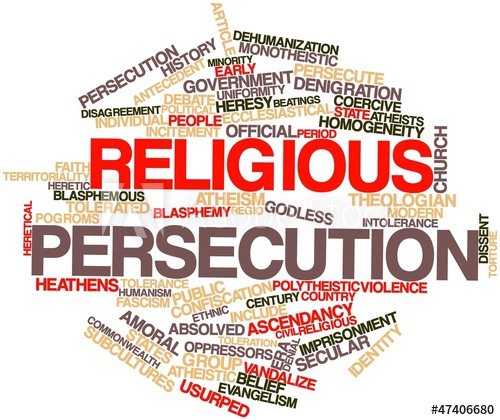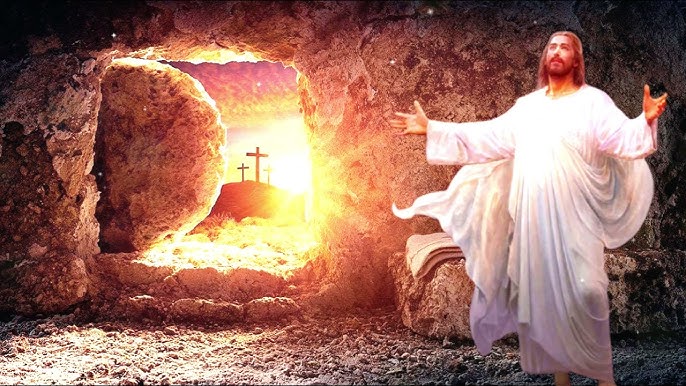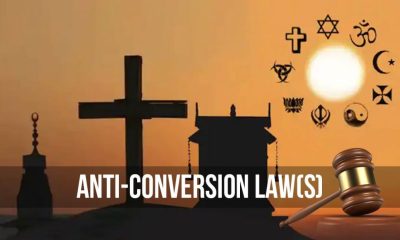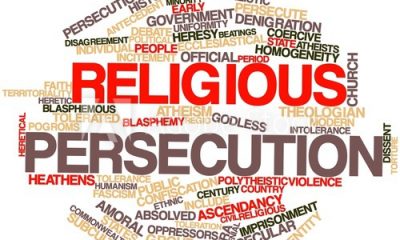Media
State Witnesses Spike in Attacks on Indian Christians Following Announcement of Anti-Conversion Law

45-year-old Ramya was one of five Christians brutally attacked by radical Hindu nationalists on October 17, 2021. When Christians arrived at church that morning, they found a Hindu monk joined by about 100 Hindutva activists were already inside the church, chanting nationalist slogans. The activists forced the worshippers to a nearby police station, resulting in the arrest of Pastor Somu Alwadi.
“A mob of men surrounded and beat me inside the police station,” Ramya told International Christian Concern (ICC). “The mob told me that they will crucify me, like Jesus was crucified. The mob took four Christians out of police station premises and brutally beat them with iron rods and wooden clubs.”
This incident is just one among many that Christians in India’s Karnataka state are enduring in recent weeks. The recent spike in persecution can be attributed to a law that the BJP-led government wants to enact in the state. On September 29, Karnataka Chief Minister B.C. Bommai announced his plan to enact an anti-conversion law in Karnataka.
Speaking about the incident that led to his arrest, Pastor Alwadi said, “I go to church to worship, never have I converted anyone. I worship a God whom I like. I did not do harm to anyone. I don’t force anyone for anything.”
Pastor Manjunath and his congregation were also attacked by radical Hindu nationalists on October 17. According to local sources, the radicals took Bibles and Christian songs books from the church and chased the congregation out of the church building. A case was booked against Pastor Manjunath on charges of forced conversion activities, and he was also sent to jail.
“This is part of the larger plan of the Hindu radicals,” Pastor Manjunath told ICC. “Their local units have become more active and very aggressive, if they could achieve what is going on, it will be very dangerous for Christians in our state.”
Manjunath’s daughter, Anusha, was also a victim of the October 17 incident. She told ICC, “We called police, thinking that that they would come and protect us. When the police arrived, they started to beat us and all the congregants in the church hall. We had no one to help and come to our aid.”
As the BJP-led government prepares to enact the anti-conversion law, Christians in Hublie organized a peaceful protest. Over 6,000 Christians participated in the rally, holding placards, and shouting slogans against the increasing attacks faced by the Christian minority.
Pastor Sunil Mahade, convener of the protest, told ICC, “There is direct connection between increased incidents of persecution and government’s announcement of bringing the anti-conversion law. The proposed anti-conversion law is unconstitutional as it violets the right to freedom of faith. There is absolutely no need of this law. There are enough clauses in the existing constitution to deal with forced or fraudulent conversions.”
“The proposed anti-conversion law is nothing but a legal permit for radical Hindu nationalists to attack and harass religious minorities,” Pastor Mahade continued. “We are mobilizing statewide support against the law, and we have been receiving a good response.”
While Karnataka has still not enacted the promised anti-conversion law, many radical Hindu nationalists on the ground are acting as if the law already exists. The increase in attacks across Karnataka has many Christians concerned about what will happen if the anti-conversion law is enacted.
In states where similar anti-conversion laws are enacted, including Odisha, Madhya Pradesh, Arunachal Pradesh, Chhattisgarh, Gujarat, Jharkhand, Himachal Pradesh, and Uttarakhand, they are widely abused. Radical nationalists falsely accuse Christians of forcefully converting individuals to Christianity to justify harassment and assault. Local police often overlook violence perpetrated against Christians due to false accusations of forced conversion.
Sources:persecution
Articles
What the Bible says (and does not say) about persecution

In places like China, India, Nigeria, North Korea and many others around the globe, Christian persecution is on the rise. It comes in many forms, from arrests by police to oppression and shunning by community and family members.
There are many examples of Christian persecution in Scripture and throughout history, from persecution of the first disciples to that of believers today in hostile areas and restricted nations. As followers of Christ, we must anchor our understanding in what God’s Word says and, just as important, does not say about persecution.
The Bible speaks directly about the reality of persecution, preparing believers to expect and endure it. In 2 Timothy 3:12, Paul writes, “Indeed, all who desire to live a godly life in Christ Jesus will be persecuted.” Peter echoes this warning in 1 Peter 4:12–13, telling believers, “Do not be surprised [by fiery trials, but rather] rejoice insofar as you share Christ’s sufferings.”
The Bible doesn’t provide a way to avoid persecution; instead, it offers peace and courage in the midst of it. In John 16:33, Jesus declares, “In the world you will have tribulation. But take heart; I have overcome the world.”
I recently had the privilege of interviewing a young lady named Hana. November marked the 20th anniversary of her father’s arrest in Eritrea. She was only 6 years old when her father went to prison, and she too was detained when her church’s Sunday school was raided by police.
During our interview, I asked her about her thoughts on the Bible’s instruction for Christians to love our enemies. Specifically, I wondered how she and her family felt about the Eritrean government that has imprisoned her father for two decades.
Hana’s reply was illuminating; she said nobody really asked her or her mother about “enemies” until they came to America.
“We knew that the government is persecuting us,” she said, “but at the same time it just felt like a reality of every Christian. Our enemy never felt [like] the government in any sense. It just felt like this is what it means to follow Christ Jesus.”
The Bible says persecution can strengthen the Church
The Bible clearly shows that persecution can advance the Gospel and unify the Church. In Philippians 1:12–13, Paul (writing from a Roman prison) shares how his imprisonment has emboldened others to proclaim Christ without fear. “I want you to know, brothers,” Paul writes, “that what has happened to me has really served to advance the Gospel, so that it has become known throughout the whole imperial guard and to all the rest that my imprisonment is for Christ.”
Throughout history, persecution has purified and strengthened the church, fueling its growth even in the most difficult and dangerous places to follow Christ. Consider the underground church in Iran, the fastest-growing Christian community in the world despite — or perhaps because of — 45 years of oppression by a government doing everything it can to hinder its work.
The church in Eritrea is another remarkable example. Pastors there have found ways to witness to others while in prison. The church thrives when its focus is sharpened, and denominational divisions fall away under the weight of shared suffering and purpose.
The Bible tells Christians how to respond to persecution
The Bible provides clear guidance on how to face persecution. Jesus’ words in Matthew 5:44 are simple and unambiguous: “Love your enemies and pray for those who persecute you.” This radical response is both a reflection of God’s love and a powerful testimony to a watching world.
The Bible also tells us that Christians who aren’t currently facing persecution still have a role to play and shows how to hold our Christian brothers and sisters in our hearts and minds: “Remember those in prison, as if you were there yourself. Remember also those being mistreated, as if you felt their pain in your own bodies” (Hebrews 13:3 NLT).
The stories and testimonies of persecuted Christians demonstrate the transformative power of following Christ’s command and example. An imprisoned pastor in Central Asia saw his treatment improve drastically after he began receiving letters of encouragement from believers worldwide. His guards became kinder and his warden more attentive, all because of the unity and love evident among the global body of Christ.
We Christians in free nations must recognize our role in supporting and praying for our persecuted brothers and sisters.
The Bible shows that persecution can be a platform for God’s power
Even amid our trials and weaknesses, God often works mightily through his people.
After a house church pastor was arrested in Iran, his wife was terrified that she might be next. She worried that she wouldn’t be able to resist torture and would give up other believers’ names. She prayed that God would hide her from the religious police. But when they arrested and interrogated her, she became empowered by the Holy Spirit, witnessing boldly to her interrogator. “You are an interrogator,” she told him, “but one day you are going to stand before the ultimate interrogator, Jesus Christ, and he is going to examine you. Without him, there is no hope for you.”
After three straight days of her bold, spirit-empowered witness, the interrogator visited her filthy jail cell late one night. She feared that he was there to kill her, but instead he placed his faith in Christ and told her how she could witness for Christ more safely. Then, the interrogator released her and her husband.
This story highlights a profound truth: God often uses human frailty to show us his strength. As Paul reminds us in 2 Corinthians 12:9, God’s power is “made perfect in weakness.”
What the Bible does NOT say about persecution
The Bible never tells believers to be afraid.
This is striking, considering the suffering brought by persecution. Yet Scripture repeatedly emphasizes courage and trust in God’s sovereignty. As Richard Wurmbrand, Romanian pastor and founder of The Voice of the Martyrs, observed, the Bible contains 366 admonitions to “fear not” — one for every day of the year, including an extra for leap years. That number was significant to Wurmbrand because he was arrested on Feb. 29, which occurs only in leap years.
Fear is a natural human response, but it does not have to define us. A Filipino pastor once told me, “Until God is finished with you, you are invincible.” His confidence was not rooted in his own human strength but in God’s purpose and power.
Persecution may not be part of your reality today, but the call to be involved remains. Whether through prayer, advocacy or encouragement to believers who are currently facing persecution, every follower of Christ has a role to play.
Let us live boldly, trusting that God’s grace and power are sufficient for every trial we face.
Sources:Christian Post
Articles
ബന്ധങ്ങളിലെ ബന്ധനങ്ങൾ (Article)
Articles
ക്രൈസ്തവ വിശ്വാസത്തിലെ യുക്തിയുടെ ആധാരം ക്രിസ്തുവിൻ്റെ പുനഃരുത്ഥാനം

ശാസ്ത്രത്തിന്റെ അടിസ്ഥാനം തെളിവുകളും തത്വചിന്തയുടെ അടിസ്ഥാനം യുക്തിയും മതത്തിന്റെ അടിസ്ഥാനം അന്ധവിശ്വാസവുമാണെന്ന ധാരണയാണ് ലോകത്തിൽ പരക്കെ വ്യാപിച്ചിട്ടുള്ളത്. മതവിശ്വാസിക്കു തെളിവുകളോ യുക്തിയോ ചരിത്രബോധമോ ആവശ്യമില്ല എന്ന് ഏതാണ്ട് എല്ലാ മതവിശ്വാസികളും ഒരുപോലെ കരുതുന്നു. “എല്ലാം ഒരു വിശ്വാസമല്ലേ…” എന്നൊരു യുക്തി മാത്രമേ മതവിശ്വാസത്തിൽ പ്രായോഗികമായിട്ടുള്ളൂ എന്നാണ് യുക്തിവാദികളും സ്വതന്ത്രചിന്തകരും കരുതുന്നത്. അതിനാൽ മതമെന്നതു യുക്തിരഹിതമായ കെട്ടുകഥകൾ മാത്രമാണെന്ന പ്രചാരണമാണ് ഇവർ നടത്തുന്നത്. ഇതിൻ്റെ ഫലമായി മതവിശ്വാസത്തിന് യാതൊരു പ്രസക്തിയുമില്ലെന്ന ചിന്ത ഇന്ന് സമൂഹത്തിലെങ്ങും വ്യാപകമായിക്കൊണ്ടിരിക്കുന്നു.
കേരളത്തിലെ പ്രമുഖ സാംസ്കാരിക നായകനും എഴുത്തുകാരനും പ്രഭാഷകനുമായ ശ്രീ എം.എന്. കാരശ്ശേരി ഫെയ്സ് ബുക്കില് കുറിച്ചു, “ഭക്തിയും യുക്തിയും ഒരുമിച്ചുപോകാന് പ്രയാസമാണ്”. മറ്റൊരു പോസ്റ്റില് അദ്ദേഹം പറയുന്നു: ”യുക്തിയുടെ മതം എന്നൊന്നില്ല, എല്ലാം ഭക്തിയുടെ മതങ്ങളാണ്” എന്ന്. ഈശ്വര വിശ്വാസത്തെ സംബന്ധിച്ച് ഈയൊരു പൊതുബോധമാണ് ഇപ്പോള് എവിടെയും കാണാൻ കഴിയുന്നത്. സമൂഹത്തെ സ്വാധീനിക്കാന് കഴിയുന്ന ഒരു സാംസ്കാരിക പ്രവര്ത്തകന് എന്ന നിലയില് കാരശേരി മാഷിൻ്റെ ഈ അഭിപ്രായം എല്ലാ നിലയിലുള്ള വ്യക്തികളെയും മാറിച്ചിന്തിക്കാന് പ്രേരിപ്പിക്കും എന്നതില് സംശയമില്ല. അതിനാല് ക്രൈസ്തവ വിശ്വാസത്തിന് ആധാരമായിരിക്കുന്നത് യുക്തിരഹിതമായ ഭക്തിയാണോ യുക്തിഭദ്രമായ ഭക്തിയാണോഎന്നാണ് ഇവിടെ പരിശോധിക്കുന്നത്.
🟥1. ശാസ്ത്രത്തിന്റെ അടിസ്ഥാനം തെളിവുകളാണ് എന്നു പറയുംപോലെ ക്രൈസ്തവ വിശ്വാസത്തിന്റെയും അടിസ്ഥാനം തെളിവുകളാല് ഉറപ്പിക്കപ്പെടേണ്ടതാണ് എന്ന നിര്ബന്ധമാണ് ബൈബിള് മുന്നോട്ടുവയ്ക്കുന്നത്. ക്രൈസ്തവ വിശ്വാസത്തിലെ യുക്തിയുടെയും ഭക്തിയുടെയും അടിസ്ഥാനം യേശുക്രിസ്തുവിന്റെ പുനഃരുത്ഥാനമാണ്. വിശ്വാസത്തിനു മതിയായ തെളിവായി യേശുക്രിസ്തുവിന്റെ പുനഃരുത്ഥാനത്തെയാണ് ബൈബിള് ചൂണ്ടിക്കാണിക്കുന്നത്. അപ്പൊസ്തൊല പ്രവൃത്തികള് 17:31ല് വിശുദ്ധ പൗലോസ് സ്ലീഹാ പറയുന്നു “എന്തെന്നാല്, താന് നിയോഗിച്ചിരിക്കുന്ന ഒരു മനുഷ്യന് വഴി ലോകത്തെ മുഴുവന് നീതിയോടെ വിധിക്കാന് അവിടുന്ന് ഒരു ദിവസം നിശ്ചയിച്ചിരിക്കുന്നു. ആ മനുഷ്യനെ മരിച്ചവരില്നിന്ന് ഉയര്പ്പിച്ചുകൊണ്ട് അവിടുന്ന് ഇതിന് ഉറപ്പു ( തെളിവ്) നല്കിയിട്ടുമുണ്ട്” (For he has set a day when he will judge the world with justice by the man he has appointed. He has given proof of this to everyone by raising him from the dead.)
ക്രിസ്തുവിന്റെ പുനഃരുത്ഥാനത്തെ തെളിവുകളുടെ അടിസ്ഥാനത്തില് സമീപിക്കുന്ന അപ്പൊസ്തൊലന്മാരെയും സഭയെയുമാണ് ബൈബിളിലും ചരിത്രത്തിലെങ്ങും കാണുന്നത്. തെളിവുകളിൽ അടിസ്ഥാനപ്പെട്ടിരിക്കുന്ന വിശ്വാസം എന്നതാണ് ക്രൈസ്തവ വിശ്വാസത്തിൻ്റെ അനന്യതയ്ക്കു കാരണം.
🟥 2. യേശുക്രിസ്തുവിന്റെ പുനഃരുത്ഥാനത്തിന് സാക്ഷികളായ അഞ്ഞൂറിലധികം പേര് ജീവിച്ചിരുന്ന സമൂഹത്തിലായിരുന്നു പൗലോസ് സ്ലീഹാ പ്രവര്ത്തിച്ചത്. അദ്ദേഹം കൊറിന്തോസിലെ സഭയ്ക്ക് എഴുതിയ കത്തില് ഇക്കാര്യം രേഖപ്പെടുത്തിയിട്ടുണ്ട്. “ക്രിസ്തു നമ്മുടെ പാപങ്ങള്ക്കുവേണ്ടി മരിക്കുകയും സംസ്കരിക്കപ്പെടുകയും എഴുതപ്പെട്ടിരുന്നതുപോലെ മൂന്നാംനാള് ഉയിര്പ്പിക്കപ്പെടുകയും ചെയ്തു. അവന് കേപ്പായ്ക്കും പിന്നീടു പന്ത്രണ്ടുപേര്ക്കും പ്രത്യക്ഷനായി. അതിനുശേഷം ഒരുമിച്ച് അഞ്ഞൂറിലധികം സഹോദരര്ക്കു പ്രത്യക്ഷനായി. അവരില് ഏതാനുംപേര് മരിച്ചുപോയി. മിക്കവരും ഇന്നും ജീവിച്ചിരിപ്പുണ്ട്. പിന്നീട് അവന് യാക്കോബിനും, തുടര്ന്ന് മറ്റെല്ലാ അപ്പസ്തോലന്മാര്ക്കും കാണപ്പെട്ടു. ഏറ്റവും ഒടുവില് അകാലജാതന് എന്നതുപോലെ എനിക്കും അവിടുന്നു പ്രത്യക്ഷനായി”. (1 കൊറിന്തോസ് 15:4-8). പുനഃരുത്ഥാനം ചെയ്ത യേശുവിനെ നേരിട്ടു കണ്ട അഞ്ഞൂറിലേറെ ദൃക്സാക്ഷികള് ഉണ്ടായിരുന്നു എന്നത് ക്രൈസ്തവ വിശ്വാസത്തിലെ യുക്തിഭദ്രത ഉറപ്പിക്കാന് ഏറ്റവും ശക്തമായ തെളിവാണ്.
🟥3. ക്രിസ്തു ഉത്ഥിതനായി എന്ന ക്രൈസ്തവ വിശ്വാസത്തിന് ബൈബിളിനു വെളിയില് ചരിത്രത്തില് വേറെ എന്തു തെളിവുണ്ട് എന്ന് ചോദിക്കുന്നവരുണ്ട്. അതിന് ഏറ്റവും നല്ല ഉത്തരം യഹൂദരാഷ്ട്രമാണ്. യേശുക്രിസ്തു ഒരു യഹൂദനും അദ്ദേഹത്തിന്റെ ആദ്യകാല ശിഷ്യന്മാരും വിശ്വാസികളും എല്ലാം യഹൂദന്മാരുമായിരുന്നു. എന്നാല് അതോടൊപ്പം മനസ്സിലാക്കേണ്ടത് യേശുവിന്റെ എതിരാളികളും വിമർശകരും യഹൂദരായിരുന്നു എന്ന വസ്തുതയാണ്. യേശുക്രിസ്തുവിന്റെ പേരിൽ യഹൂദരോടൊപ്പം ചേര്ന്നുനിന്നത് റോമാ സാമ്രാജ്യവും അതിലെ ഉന്നതസ്ഥാനീയരായ ഭരണാധികാരികളുമായിരുന്നു. എന്നാൽ യേശുക്രിസ്തു ഉയിര്ത്തെഴുന്നേറ്റു എന്ന ക്രൈസ്തവസഭയുടെ വാദത്തെ യഹൂദമത നേതൃത്വമോ റോമാസാമ്രാജ്യമോ ചരിത്രത്തില് ഒരിടത്തും നിഷേധിച്ചിട്ടില്ല.
🟥 4. മോശെയുടെ കാലഘട്ടമായ ബി.സി 13-12 നൂറ്റാണ്ടുകള് മുതൽ തങ്ങളുടെ രാജ്യത്തിന്റെയും മതവിശ്വാസത്തിന്റെയും ചരിത്രവസ്തുതകള് വ്യക്തമായും കൃത്യമായും സൂക്ഷിക്കുകയും ചരിത്രത്തെളിവുകളെ വിശ്വാസത്തിന് ആധാരമായി കൊണ്ടു നടക്കുകയും ചെയ്യുന്നവരാണ് യഹൂദര്. ഇവരുടെ മതനിലപാടുകള് അതിശക്തമായിരുന്ന സമൂഹത്തിലാണ് ”യേശുക്രിസ്തു ഉയിര്ത്തെഴുന്നേറ്റു” എന്ന സംഭവം ചര്ച്ചയാകുന്നത്. യഹൂദര് തന്നെയാണ് തെളിവുകളുടെ അടിസ്ഥാനത്തില് ഈ സംഭവം പ്രചരിപ്പിക്കുകയും ആദ്യമായി ഈ വിശ്വാസത്തിന്റെ ഭാഗമാവുകയും ചെയ്തത്. ക്രൈസ്തവിശ്വാസത്തിന് ആധാരം ചരിത്രപരമായ യാഥാര്ത്ഥ്യങ്ങളാണെന്നതിന് ഇതിലേറെ തെളിവുകള് ആവശ്യമില്ല.
🟥 5. യേശുക്രിസ്തുവിനെ ക്രൂശിക്കുകയും കല്ലറയില് അടക്കം ചെയ്യുകയും ചെയ്തതു റോമാ സാമ്രാജ്യമായിരുന്നു. “അവര്പോയി കല്ലിനു മുദ്രവച്ച്, കാവല്ക്കാരെ നിര്ത്തി കല്ലറ ഭദ്രമാക്കി” (മത്തായി 27:66). ക്രിസ്തുവിന്റെ മൃതദേഹം അടക്കം ചെയ്ത കല്ലറയെ “റോമന് ഇംപീരിയൽ മുദ്ര” (Roman Imperial Monogram) വച്ചുകൊണ്ട് സര്ക്കാര് എല്ലാ നിലയിലും സംരക്ഷിച്ചു. റോമാ സാമ്രാജ്യം ഇത്രമേല് ഭദ്രമാക്കി സൂക്ഷിച്ച കല്ലറയില്നിന്ന് യേശുക്രിസ്തു ഉയിര്ത്തെഴന്നേറ്റു എന്നത് യാഥാര്ത്ഥ്യമായിരുന്നില്ലെങ്കില് അത് റോം തന്നെ നിഷേധിക്കുമായിരുന്നു. എന്നാല് ഈ സംഭവം റോമാ സാമ്രാജ്യം ചരിത്രത്തിലെങ്ങും നിഷേധിച്ചിട്ടില്ല.
🟥 6.യേശുക്രിസ്തുവിന്റെ പുനഃരുത്ഥാനത്തിന്റെ അടിസ്ഥാനത്തിൽ ക്രൈസ്തവ സഭ രൂപംകൊണ്ടതു റോമാ സാമ്രാജ്യത്തിലാണ്. സഭയെ ഇല്ലാതാക്കാന് പലനിലയിലും സര്ക്കാര് ശ്രമിച്ചിരുന്നു. ക്രൈസ്തവ വിശ്വാസത്തെ ഇല്ലാതാക്കാൻ ക്രിസ്തുവിന്റെ പുനഃരുത്ഥാനം കെട്ടുകഥയാണ്, അങ്ങനെയൊന്നു സംഭവിച്ചിട്ടില്ല എന്നു സ്ഥാപിച്ചാൽ മതിയായിരുന്നു. എന്നാൽ സത്യസന്ധമായ ഈ ചരിത്രത്തെ നിഷേധിക്കാൻ റോം ധൈര്യപ്പെട്ടില്ല. തന്നെയുമല്ല, മൂന്നു നൂറ്റാണ്ടിനു ശേഷം റോമന് ചക്രവര്ത്തിയായിരുന്ന മഹാനായ കോണ്സ്റ്റന്റൈന് തന്നെ യേശുക്രിസ്തുവില് വിശ്വസിക്കുകയും ക്രിസ്തുവിശ്വാസത്തെ സാമ്രാജ്യത്തിന്റെ മതമായി പ്രഖ്യാപിക്കുകയും ചെയ്തു. ഈ ചരിത്രസംഭവം ക്രൈസ്തവ വിശ്വാസത്തിന്റെ യുക്തിഭദ്രതയ്ക്കു മറ്റൊരു തെളിവാണ്.
🟥 7. ഒരു വ്യക്തി ക്രിസ്തുവില് വിശ്വസിക്കുന്നു എന്നു പുറംലോകമറിഞ്ഞാല് കൊല്ലപ്പെടാന് വേറെ യാതൊന്നും ആവശ്യമില്ലാതിരുന്ന ഒരു കാലത്ത് അനേകായിരങ്ങളാണ് ക്രിസ്തുവിശ്വാസം ഏറ്റുപറയുവാന് തയ്യാറായത്. ഈ സാഹചര്യത്തിലാണ് ക്രിസ്തുശിഷ്യനായ പത്രോസ് പറയുന്നത്: “യേശുവിനെ ദൈവം ഉയിര്പ്പിച്ചു. ഞങ്ങളെല്ലാവരും അതിനു സാക്ഷികളാണ്” (അപ്പൊസ്തൊല പ്രവൃത്തികള് 2:32) എന്ന്. പത്രോസ് ഈ പ്രഖ്യാപനം നടത്തുന്നത് പതിനെട്ടോളം ഭാഷകളിലും രാജ്യങ്ങളിലും നിന്നു പന്തക്കുസ്താ തിരുന്നാള് ആഘോഷത്തിനായി ജെറുസലേമില് വന്ന ജനങ്ങളുടെ മധ്യേ നിന്നായിരുന്നു. ക്രിസ്തുവിന്റെ കാലത്ത് ജെറുസലേമിലെ ജനസംഖ്യ ഒരു ലക്ഷമായിരുന്നുവെന്നും പന്തക്കുസ്താ ഉത്സവസമയത്ത് വിദേശത്തുനിന്നുള്ള യുഹൂദര്കൂടി വരുമ്പോള് ഇത് പത്തുലക്ഷം വരെ ആകുമായിരുന്നു എന്നുമാണ് ചരിത്രം. മതതീവ്രത മുറ്റിനില്ക്കുന്ന ഇത്രവലിയൊരു ജനസഞ്ചയത്തിനു മുന്നില്നിന്ന് വസ്തുതാപരമല്ലാത്ത പ്രസംഗം നടത്തിയാല് ഉണ്ടാകുന്ന പ്രത്യാഘാതം ചെറുതായിരിക്കില്ല. എന്നാല് ഈ പ്രസംഗം കേട്ടവരില് 3,000 പേര് ക്രിസ്തുവിശ്വാസം സ്വീകരിച്ചതായിട്ടാണ് ബൈബിളിൽ രേഖപ്പെടുത്തിയിരിക്കുന്നത്. ഈ സംഭവം യഹൂദര് എവിടെയും നിഷേധിച്ചിട്ടില്ല. ഇപ്രകാരം ക്രിസ്തുവിശ്വാസം സ്വീകരിച്ചവര് തങ്ങളുടെ സ്വദേശത്തേക്കു തിരികെപ്പോയി ഈ സംഭവം പ്രസിദ്ധമാക്കുകയും അതതു ദേശങ്ങളില് ക്രൈസ്തവ വിശ്വാസം പ്രചരിക്കുകയും ചെയ്തു.
🟥 8. തങ്ങള് പ്രസംഗിക്കുന്നത് ചില കെട്ടുകഥകളെ ആസ്പദമാക്കിയല്ല എന്ന് പത്രോസ് സ്ലീഹാ തന്റെ സാര്വ്വത്രിക സഭയ്ക്കായുള്ള ലേഖനത്തില് എഴുതുന്നുണ്ട്. “നമ്മുടെ കര്ത്താവായ യേശുക്രിസ്തുവിൻ്റെ ശക്തിയെയും പ്രത്യാഗമനത്തെയും കുറിച്ചു ഞങ്ങള് നിങ്ങളെ അറിയിച്ചതു കൗശലപൂര്വം മെനഞ്ഞെടുത്ത കല്പിതകഥകളെ വിശ്വസിച്ചതുകൊണ്ടല്ല; ഞങ്ങള് അവൻ്റെ ശക്തിപ്രാഭവത്തിൻ്റെ ദൃക്സാക്ഷികളായതുകൊണ്ടാണ്”. (2 പത്രോസ് 1:16). ക്രിസ്തുവിന്റെ മഹത്വം നേരിട്ടു ദര്ശിച്ചവരുടെ സാക്ഷി വിവരണങ്ങളാണ് സുവിശേഷങ്ങള്. ഈ വചനം എഴുതിയ പത്രോസിന്റെ ശവകുടീരത്തിനു മുകളിലാണ് റോമില് സെന്റ് പീറ്റേഴ്സ് ബസലിക്ക നിര്മ്മിച്ചിരിക്കുന്നത്. വസ്തുനിഷ്ടമായ ചരിത്രയാഥാര്ത്ഥ്യത്തിനു മുകളിലാണ് ക്രിസ്തുവിന്റെ സഭ സ്ഥാപിതമായിരിക്കുന്നത് എന്നർത്ഥം.
🟥 9. ക്രിസ്തു ശിഷ്യായിരുന്ന യോഹന്നാന്റെ അതുല്യമായ സാക്ഷ്യം ഏറെ വിസ്മയാവഹമാണ്. “ആദിമുതല് ഉണ്ടായിരുന്നതും ഞങ്ങള്കേട്ടതും സ്വന്തം കണ്ണുകൊണ്ടു കണ്ടതും സൂക്ഷിച്ചുവീക്ഷിച്ചതും കൈകൊണ്ടു സ്പര്ശിച്ചതുമായ ജീവൻ്റെ വചനത്തെപ്പറ്റി ഞങ്ങള് അറിയിക്കുന്നു. ജീവന് വെളിപ്പെട്ടു; ഞങ്ങള് അതു കണ്ടു; അതിനു സാക്ഷ്യം നല്കുകയുംചെയ്യുന്നു” ( 1 യോഹ 1:1). ക്രിസ്തുവിൻ്റെ പരസ്യ ജീവിതം മുതൽ സ്വർഗ്ഗാരോഹണം വരെ കൂടെ നടന്ന ഒരു ശിഷ്യനായ യോഹന്നാൻ്റെ ഇത്രമേൽ ശക്തമായ സാക്ഷി വിവരണം ക്രൈസ്തവ വിശ്വാസത്തിൻ്റെ യുക്തിഭദ്രത ഉറപ്പിക്കുന്നു.
🟥 10. യഹൂദമതത്തിന്റെ പ്രബോധനങ്ങളില് തീവ്രമായി വിശ്വസിക്കുകയും ക്രിസ്തുവിശ്വാസം സ്വീകരിച്ച യഹൂദരെ തെരഞ്ഞുപിടിച്ചു കൊല്ലേണ്ടതിന് ഒരു ചാവേറായി ഇറങ്ങിപ്പുറപ്പെടുകയും ചെയ്ത ഒരു മതഭീകരനായിരുന്നു താര്സൂസിലെ സാവൂള്. ക്രൈസ്തവരെ തേടിപ്പിടിക്കാൻ സിറിയയിലേക്കു പോകുംവഴിയാണ് ഉത്ഥിതനായ ക്രിസ്തുവിന്റെ പ്രത്യക്ഷീകരണം അദ്ദേഹത്തിന് ഉണ്ടായത്. ഈ സംഭവത്തിനു ശേഷം അദ്ദേഹം ക്രിസ്തുവിശ്വാസത്തിന്റെ ഭാഗമായിത്തീര്ന്നു. സാവൂള് പിന്നീട് പോള് എന്ന പേരിലാണ് ക്രൈസ്തവചരിത്രത്തില് അറിയപ്പെട്ടത്. അദ്ദേഹം കൊറിന്തിലെ ക്രൈസ്തവര്ക്കുള്ള ലേഖനത്തില് ഇപ്രകാരം എഴുതി: “ക്രിസ്തു ഉയിര്പ്പിക്കപ്പെട്ടില്ലെങ്കില് ഞങ്ങളുടെ പ്രസംഗം വ്യര്ഥമാണ്. നിങ്ങളുടെ വിശ്വാസവും വ്യര്ഥം”.(1 കൊരി 15:14). ക്രിസ്തു ഉയിര്ത്തെഴുന്നേറ്റു എന്ന തെളിവിന്റെ അടിസ്ഥാനത്തിലായിരുന്നു പോള് തന്റെ വിശ്വാസത്തിലും സഭാശുശ്രൂഷയിലും മുന്നോട്ടുപോയത്.
🟥 11. യേശുക്രിസ്തുവിന്റെ ക്രൂശീകരണവുമായി ബന്ധപ്പെട്ട് യഹൂദര്ക്കെതിരേ ഗുരുതരമായ ആരോപണങ്ങള് ഉന്നയിച്ച വ്യക്തിയായിരുന്നു സെന്റ് പോള്. ”യഹൂദര് കര്ത്താവായ യേശുവിനെയും പ്രവാചകന്മാരെയും വധിച്ചു; ഞങ്ങളെ ആട്ടിപ്പുറത്താക്കി” (1 തെസ്സലോനിക്ക 2:15). എന്നു വളരെ പ്രകോപനപരമായിട്ടാണ് അദ്ദേഹം വിശ്വസിക്കുകയും പ്രസംഗിക്കുകയും ചെയ്തത്. എന്നാല് ഈ ആരോപണത്തെ എതിര്ക്കാന് ആക്കാലത്തോ ഇക്കാലംവരെയോ യഹൂദര് തയ്യാറായിട്ടില്ല. ഇത് യേശുക്രിസ്തുവിന്റെ ജനനം, മരണം, പുനഃരുത്ഥാനം തുടങ്ങിയ എല്ലാ ചരിത്രയാഥാര്ത്ഥ്യങ്ങളെയും അംഗീകരിക്കുന്ന യഹൂദ നിലപാടാണ് വ്യക്തമാക്കുന്നത്. യഹൂദരുടെ വാഗ്ദത്ത മശിഹാ “തച്ചൻ്റെ മകനായ നസറത്തുകാരൻ യഹ്ശുവ” ആണെന്നു തിരിച്ചറിഞ്ഞ് “Jews for Jesus” തുടങ്ങിയ മൂവ്മെന്റുകളിലൂടെ ക്രിസ്തുവിശ്വാസത്തിലേക്ക് ആയിരക്കണക്കിന് യഹൂദരാണ് വർഷം തോറും കടന്നുവരുന്നത്.
🟥12. ക്രിസ്തീയ വിശ്വാസത്തിൻ്റെ അടിസ്ഥാനം കെട്ടുകളോ യുക്തിരഹിതമായ പ്രതിഭാസങ്ങളോ താത്വികമായി സ്ഥാപിക്കാന് കഴിയാത്ത അസംബന്ധങ്ങളോ അല്ല. എഡി ഒന്നാം നൂറ്റാണ്ടു മുതല് നിലനില്ക്കുന്ന ചരിത്രവസ്തുതകളുടെയും യുക്തിഭദ്രമായ വിശ്വാസത്തിന്റെയും അടിസ്ഥാനത്തിലുള്ള ദൈവഭക്തിയാണ് ക്രൈസ്തവർ പിൻപറ്റുന്നത്. ഈ യാഥാര്ത്ഥ്യങ്ങളെ കണ്ടില്ലെന്നു നടിക്കുകയാണ് ശ്രീ എം.എന്. കാരശേരിയെ പോലുള്ളവർ. തന്റെ മതപശ്ചാത്തലത്തിന് ആധാരമായിരിക്കുന്ന വസ്തുതകളില് വ്യാപരിക്കുന്ന യുക്തിരാഹിത്യത്തിനു തുല്യമാണ് സകലമത വിശ്വാസങ്ങളുടെയും അടിസ്ഥാനം എന്നു കരുതുന്ന കാരശേരി മാഷ് ഈ തെറ്റിദ്ധാരണകള് സ്വയം തിരുത്തുകയും ക്രിസ്തുവിശ്വാസത്തിൻ്റെ ഭാഗമാവുകയും ചെയ്യുന്നതാണ് ഏറ്റവും യുക്തമായ കാര്യം.
Sources:marianvibes
-

 Travel7 months ago
Travel7 months agoയാക്കൂസ കരിഷ്മ:ഓല സ്കൂട്ടറിനേക്കാൾ വിലക്കുറവിൽ കുഞ്ഞൻ കാർ; സിറ്റി യാത്രകൾക്ക് ഇനി ഇവൻ മതിയാവും
-

 Movie1 month ago
Movie1 month agoFor KING + COUNTRY Stars’ Big Plan to Bring Message of Jesus, ‘Redemption of Humanity’ to People Across America
-

 Movie4 weeks ago
Movie4 weeks agoFor KING + COUNTRY Stars’ Big Plan to Bring Message of Jesus, ‘Redemption of Humanity’ to People Across America
-

 Tech5 months ago
Tech5 months agoചിത്രങ്ങൾ എഡിറ്റ് ചെയ്യാം; വാട്സ്ആപ്പിലെ ‘നീല വളയം’ സ്മാർട്ടാകുന്നു, കാര്യമായ മാറ്റങ്ങൾ
-

 National10 months ago
National10 months ago300,000-Member Indian Church to Plant 40 More Megachurches
-

 National10 months ago
National10 months agoനെയ്തേലിപ്പടി ക്രൂസേഡിന് അനുഗ്രഹീത സമാപ്തി
-

 Movie9 months ago
Movie9 months agoActor Ryan Phillippe ‘Craving’ Relationship With God After Movie About Christian Missionary
-

 Articles6 months ago
Articles6 months ago8 ways the Kingdom connects us back to the Garden of Eden






















